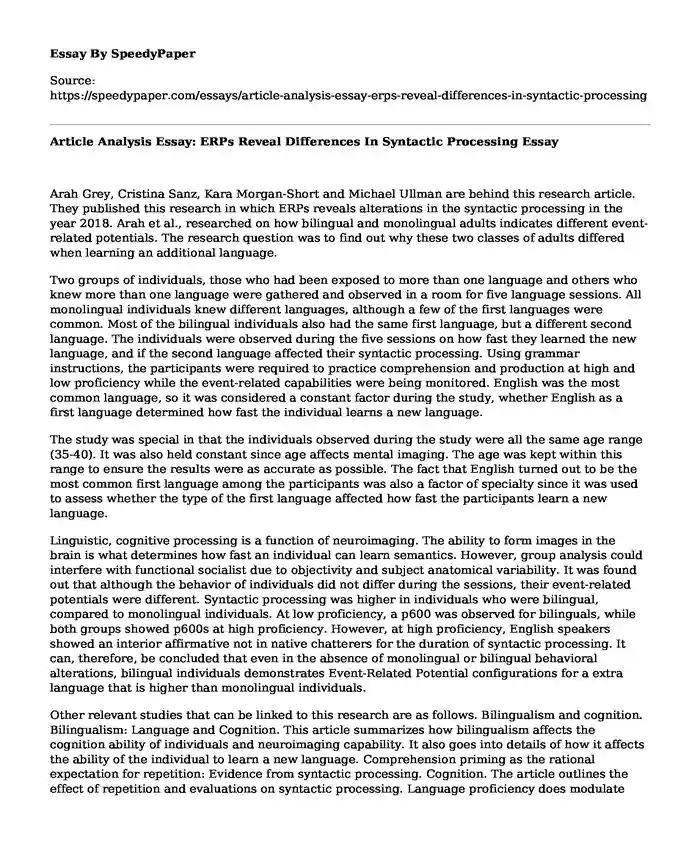
| Type of paper: | Article review |
| Categories: | Learning Linguistics Languages |
| Pages: | 3 |
| Wordcount: | 640 words |
Arah Grey, Cristina Sanz, Kara Morgan-Short and Michael Ullman are behind this research article. They published this research in which ERPs reveals alterations in the syntactic processing in the year 2018. Arah et al., researched on how bilingual and monolingual adults indicates different event-related potentials. The research question was to find out why these two classes of adults differed when learning an additional language.
Two groups of individuals, those who had been exposed to more than one language and others who knew more than one language were gathered and observed in a room for five language sessions. All monolingual individuals knew different languages, although a few of the first languages were common. Most of the bilingual individuals also had the same first language, but a different second language. The individuals were observed during the five sessions on how fast they learned the new language, and if the second language affected their syntactic processing. Using grammar instructions, the participants were required to practice comprehension and production at high and low proficiency while the event-related capabilities were being monitored. English was the most common language, so it was considered a constant factor during the study, whether English as a first language determined how fast the individual learns a new language.
The study was special in that the individuals observed during the study were all the same age range (35-40). It was also held constant since age affects mental imaging. The age was kept within this range to ensure the results were as accurate as possible. The fact that English turned out to be the most common first language among the participants was also a factor of specialty since it was used to assess whether the type of the first language affected how fast the participants learn a new language.
Linguistic, cognitive processing is a function of neuroimaging. The ability to form images in the brain is what determines how fast an individual can learn semantics. However, group analysis could interfere with functional socialist due to objectivity and subject anatomical variability. It was found out that although the behavior of individuals did not differ during the sessions, their event-related potentials were different. Syntactic processing was higher in individuals who were bilingual, compared to monolingual individuals. At low proficiency, a p600 was observed for bilinguals, while both groups showed p600s at high proficiency. However, at high proficiency, English speakers showed an interior affirmative not in native chatterers for the duration of syntactic processing. It can, therefore, be concluded that even in the absence of monolingual or bilingual behavioral alterations, bilingual individuals demonstrates Event-Related Potential configurations for a extra language that is higher than monolingual individuals.
Other relevant studies that can be linked to this research are as follows. Bilingualism and cognition. Bilingualism: Language and Cognition. This article summarizes how bilingualism affects the cognition ability of individuals and neuroimaging capability. It also goes into details of how it affects the ability of the individual to learn a new language. Comprehension priming as the rational expectation for repetition: Evidence from syntactic processing. Cognition. The article outlines the effect of repetition and evaluations on syntactic processing. Language proficiency does modulate executive control in older bilinguals. Aging, Neuropsychology, and Cognition. The article summarizes the advantage of learning more than one language and the advantages it gives the individual regarding learning new languages.
References
Grey, S., Sanz, C., Morgan-Short, K., & Ullman, M. T. (2018). Bilingual and monolingual adults learning an additional language: ERPs reveal differences in syntactic processing. Bilingualism: Language and Cognition, 21(5), 970-994.
Mishra, R. K., Padmanabhuni, M., Bhandari, P., Viswambharan, S., & Prasad, S. G. (2018). Language proficiency does modulate executive control in older bilinguals. Aging, Neuropsychology, and Cognition, 1-32.
Myslin, M., & Levy, R. (2016). Comprehension priming as the rational expectation for repetition: Evidence from syntactic processing. Cognition, 147, 29-56.
Valian, V. (2015). Bilingualism and cognition. Bilingualism: Language and Cognition, 18(1), 3-24.
Cite this page
Article Analysis Essay: ERPs Reveal Differences In Syntactic Processing. (2022, Dec 30). Retrieved from https://speedypaper.com/essays/article-analysis-essay-erps-reveal-differences-in-syntactic-processing
Request Removal
If you are the original author of this essay and no longer wish to have it published on the SpeedyPaper website, please click below to request its removal:
- Free Essay: Ping Chong Awareness Dispute Racial Problem in America
- Essay Example about Cultural Variations in the Use of Alcohol and Drugs
- Free Example of Treatment Report: Case Study on Nazlin's Terms of Privacy
- SDLC Methodologies Essay Sample
- Essay Sample on Adam And Eve: History or Myth?
- Essay Sample on Consideration Form for Deafness
- Essay Example. Education, History, Oppression, Microaggression, And Resistance
Popular categories




